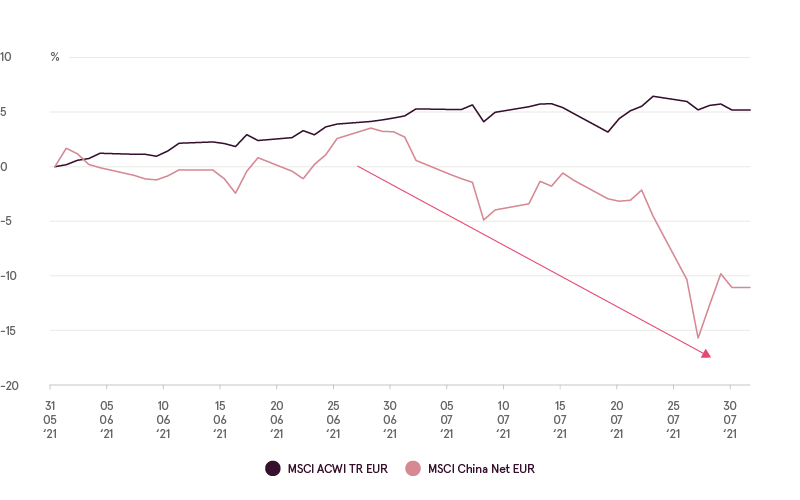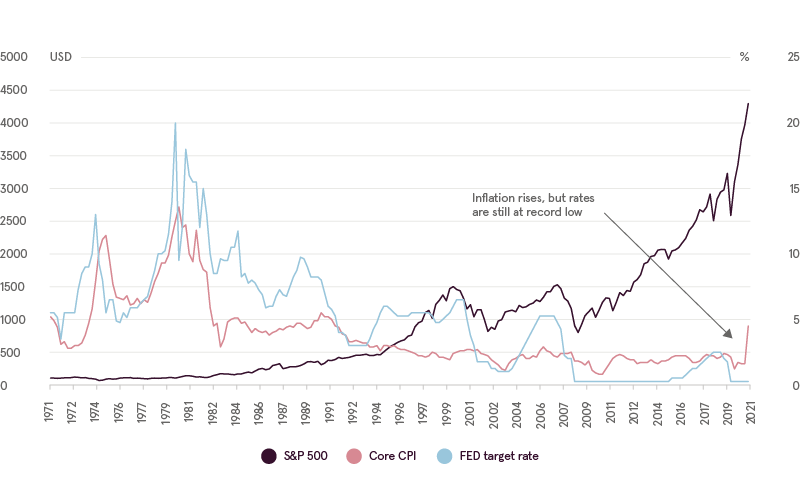Financial markets drift higher amid increased volatility | Luminor
Financial markets drift higher amid increased volatility

- ECB changed inflation target to allow inflation to overshoot its 2% target
- Prices in US are climbing higher, but markets still believe that inflation is transitory
Although we expected July to be quite noneventful month, policymakers and central banks announced market moving news, which could have a long-term impact. Moreover, in July, markets were spooked by the spread of the COVID-19 Delta variant, which could force governments to reintroduce restrictions or even lockdowns. Hence, most indexes had several sharp pullbacks during the month. However, every time a dip-buying trend prevailed, as investors rushed in to buy stocks.
Asian stocks suffered big losses, as crackdown on Chinese companies intensified. Last month, country officials launched a data-related cybersecurity investigation into the ride-hailing company Didi Global soon after it raised USD4.4 billion in a New York IPO. Later, Chinese authorities imposed substantial limitations on the booming private education and tutoring sector. After onslaught of rules that limit growth and, in some cases, decimate entire business models, investors reevaluated the dangers of regulatory risk and started to cut exposure to such companies. Moreover, the stock rout deepened, as Chinese exporters were hit by rising costs and continuing supply chain disruptions amid shipping container shortage.
World and China equity indexes

Source: Bloomberg Finance L.P.
Central banks are starting to hint about the end of massive stimulus, which was introduced during COVID-19 lockdowns to support the economy. Rising prices of goods and services could provoke the European Central Bank (ECB) and the Federal Reserve (FED) to take measures to control inflation. Central bank governors understand that any hint of tapering could provoke sharp correction in the markets and their communication is very subtle.
After the 18-month strategy review, the ECB announced that they set the inflation target at 2% in the medium term. By doing so, they dropped their previous formulation “below but close to 2%”. The ECB made no specific reference to tolerating an inflation overshoot, but the ECB president Christine Lagarde acknowledged, that inflation could overshoot the target. She also mentioned, that the current ECB’s EUR1.85 trillion bond buying program is expected to last until March 2022 and afterwards it could be transitioned to a new format. The ECB said that current risks to growth are seen as “broadly balanced”, rather than tilted to the downside.
Prices for goods and services paid by US consumers surged in June the most since 2008, topping forecasts and testing the FED’s commitment to support the economy. Core CPI, a widely tracked US inflation measure, which excludes volatile components, rose 4.5% year on year in June 2021, the largest advance since November 1991. Nonetheless, investors’ reaction shows, that market participants still believe the FED prediction, that inflation overshoot is a temporary phenomenon.
Inflation, Fed target rate and S&P 500

Source: Bloomberg Finance L.P.
Currently, we see a mix of positive and negative factors, which influence the markets. For example, second quarter corporate financial results positively impacted equity indexes as most companies were able to beat forecasts. At the time of writing this overview, 87% of S&P 500 index companies announced estimates beating earnings, according to Bloomberg. Also, the initial market participant reaction to the spread of the COVID-19 Delta variant was quickly reversed, as vaccination rates are going up and the threat of a full lockdown does not seem that probable.
On the other hand, we still observe deterioration of market breadth indicators. For example, the percentage of S&P 500 stocks above their respective 50-day moving average (MA) decreased from almost 85% to below 50% of index constituents from the end of April to the end of last month. Moreover, the same tendency is also present in the World index (MSCI ACWI). At the end of July, less than half constituents of MSCI ACWI were above 50-day MA, while several months ago, more than 60% of constituents were above. This indicates that, “beneath the surface”, the market could be weakening.
In addition, increased tax burden is another long-term risk to IT giants and other multinational companies. The G20 finance ministers – who represent 19 countries with the largest and fastest-growing economies, as well as the European Union – backed a plan, which will see multinational companies pay a minimum global corporate tax rate of 15% around the world. The plan to battle tax avoidance is likely to affect companies like Amazon, Facebook, Google, and others.
Warnings:
- This Marketing Communication is not considered investment research and has not been prepared in accordance with standards applicable to independent investment research.
- This Marketing Communication does not limit or prohibit the bank or any of its employees from dealing prior to its dissemination.
Origin of the Marketing Communication
This Marketing Communication originates from Portfolio Management unit (hereinafter referred to as PMU) – a division of Luminor Bank AS (reg. No 11315936, with registered address at Liivalaia 45, 10145, Tallinn, Republic of Estonia, hereinafter - Luminor). PMU is involved in the provision of discretionary portfolio management services to Luminor clients.
Supervisory authority
As a credit institution Luminor is subject to supervision by the Estonian financial supervision and resolution authority (Finantsinspektsioon). Additionally, Luminor is subject to supervision by the European Central Bank (ECB), which undertakes such supervision within the Single Supervisory Mechanism (SSM), which consists of the ECB and the national responsible authorities (Council Regulation (EU) No 1024/2013 - SSM Regulation). Unless set out herein explicitly otherwise, references to legal norms refer to norms enacted by the Republic of Estonia.
Content and source of the publication
This Marketing Communication has been prepared by PMU for information purposes. Luminor will not consider recipients of this Communication as its clients and accepts no liability for use by them of the contents, which may not be suitable for their personal use.
Opinions of PMU may deviate from recommendations or opinions presented by the Luminor Markets unit. The reason may typically be the result of differing investment horizons, using specific methodologies, taking into consideration personal circumstances, applying a specific risk assessment, portfolio considerations or other factors. Opinions, price targets and calculations are based on one or more methods of valuation, for instance cash flow analysis, use of multiples, behavioural technical analyses of underlying market movements in combination with considerations of the market situation, interest rate forecasts, currency forecasts and investment horizon.
Luminor uses public sources that it believes to be reliable. However, Luminor has not performed independent verification. Luminor makes no guarantee, representation or warranty as to their accuracy or completeness. All investments entail a risk and may result in both profits and losses.
This Marketing Communication constitutes neither a solicitation of an offer nor a prospectus in the sense of applicable laws. An investment decision in respect of a financial instrument, a financial product or an investment (all hereinafter “product”) must be made on the basis of an approved, published prospectus or the complete documentation for such a product in question and not on the basis of this document. Neither this document nor any of its components shall form the basis for any kind of contract or commitment whatsoever. This document is not a substitute for the necessary advice on the purchase or sale of a financial instrument or a financial product.
No Advice
This Marketing Communication has been prepared by Luminor PMU as general information and shall not be construed as the sole basis for an investment decision. It is not intended as a personal recommendation of particular financial instruments or strategies. Luminor accepts no liability for the use of the Marketing Communication content by its recipients.
If this Marketing Communication contains recommendations, those recommendations shall not be considered as an objective or independent explanation of the matters discussed herein. This document does not constitute personal investment advice or take into account the individual financial circumstances or objectives of the persons who receive it. The securities or other financial instruments discussed herein may not be suitable for all investors. The investor bears all risk of loss in connection with an investment. Luminor recommends that investors independently evaluate each issuer, security or instrument discussed herein and consult any independent advisors if they believe it necessary.
The information contained in this document also does not constitute advice on the tax consequences of making any particular investment decision. The estimates of costs and charges related to specific investment products are not provided therein. Each investor shall make his/her own appraisal of the tax and other financial advantages and disadvantages of his/her investment.
Risk information
The risk of investing in certain financial instruments, including those mentioned in this document, is generally high, as their market value is exposed to many different factors. The value of and income from any investment may fluctuate from day to day as a result of changes in relevant economic markets (including changes in market liquidity). The information herein is not intended to predict actual results, which may differ substantially from those reflected. Past performance is not necessarily indicative of future results. When investing in individual financial instruments the investor may lose all or part of their investments.
Important disclosures of risks regarding investment products and investment services are available here.
Conflicts of interest
To avoid occurrence of potential conflicts of interest as well as to manage personal account dealing and / or insider trading, the employees of Luminor are subject to the internal rules on sound ethical conduct, management of inside information, and handling of unpublished research material and personal account dealing. The internal rules have been prepared in accordance with applicable legislation and relevant industry standards. Luminor’s Remuneration Policy establishes no link between revenues from capital markets activity and remuneration of individual employees.
The availability of this Marketing Communication is not associated with the amount of executed transactions or volume thereof.
This material has been prepared following the Luminor Conflict of Interest Policy, which may be viewed here.
Distribution
This Marketing Communication may not be transmitted to, or distributed within, the United States of America or Canada or their respective territories or possessions, nor may it be distributed to any U.S. person or any person resident in Canada. The document may not be duplicated, reproduced and(or) distributed without Luminor’s prior written consent.
